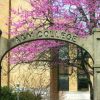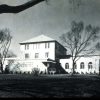calsfoundation@cals.org
Daisilee Hutchins Berry (1929–1998)
In the 1960s and 1970s, Daisilee Hutchins Berry—a physician, researcher, and educator—pioneered the field of pediatric hematology/oncology at what is now the University of Arkansas for Medical Sciences (UAMS) and Arkansas Children’s Hospital (ACH) in Little Rock (Pulaski County). In 2022, U.S. News and World Report ranked ACH’s pediatric hematology/oncology program as one of the best in the nation.
Daisilee Hutchins Dodge was born on February 19, 1929, in Honolulu, Hawaii, to Frederick Bradstreet Dodge Jr., who was an army colonel, and Daisy Lee Hutchins Dodge. She had one sister and one brother. Sometime in the early 1930s, her parents divorced, and her mother remarried Malvern (Hot Spring County) native Morgan C. Berry, an army surgeon who had been a 1916 graduate of what later became UAMS. Daisilee Berry’s brother Frederick B. Berry became a cardiologist in Little Rock.
After living in California, Michigan, Georgia, and Texas, her family moved to Arkadelphia (Clark County) when she was a teenager. In 1949, she graduated from the University of Arkansas (UA) in Fayetteville (Washington County). In 1952, she earned a master’s degree in nursing from Case Western Reserve University in Cleveland, Ohio. In 1959, Berry received her medical degree from what is now UAMS.
In 1963, she completed a fellowship in hematology/oncology at Washington University School of Medicine in St. Louis, Missouri. In 1964, she returned to what is now UAMS as an assistant professor of pediatrics. In the late 1960s, she completed research fellowships in molecular biology and physiology at Duke University Medical School in Durham, North Carolina. Berry never married and had no children.
The development of modern multimodal cancer treatment—the area Berry would come to focus on in her work—had begun in the late 1940s. Over time, more effective chemotherapeutic agents and protocols, cooperative clinical trials, and supportive therapies, used in combination with surgery and radiation, revolutionized oncology. In the 1960s and early 1970s, Dr. Donald Pinkel of St. Jude Children’s Research Hospital in Memphis, Tennessee, revolutionized treatment for Acute Lymphocytic Leukemia (ALL), which was the most commonly occurring type of childhood cancer. Pinkel’s innovative regimen of multi-drug combination chemotherapy and central nervous system prophylaxis dramatically improved ALL survival rates.
After establishing the pediatric hematology/oncology program at what is now UAMS in 1967, Berry moved it to ACH in 1976. In 1975, the UA Board of Trustees appointed Berry and Dr. Joycelyn Elders to the medical school’s board of admissions. From 1980 to 1982, Berry chaired the National Cancer Institute’s Clinical Cancer Education Committee.
From 1977 to 1992, Berry served on committees in the Children’s Oncology Group (COG). Formerly known as the Pediatric Oncology Group, the COG is a national organization dedicated to cancer research in the form of federally funded clinical trials. As a COG researcher, she conducted cooperative clinical trials for patients with ALL and other types of childhood cancer.
In the 1990s, Berry expanded her work as a medical educator. Originally established in 1973 as the Area Health Education Centers, the UAMS Regional Campuses are educational centers designed to address shortages of healthcare professionals in medically underserved Arkansas communities. Beginning in 1991, she served as a medical education consultant for the Delta Health Education program in Helena-West Helena (Phillips County), which is now known as the UAMS East Regional Campus.
From 1991 to 1998, she served as the director of education for the UAMS Arkansas Cancer Research Center (ACRC). In 2007, the ACRC became the Winthrop P. Rockefeller Cancer Institute, the most comprehensive cancer treatment and research facility in the state.
In 1995, the American Association for Cancer Education (AACE) awarded her the Margaret Hay Edwards Achievement Medal for her contributions to cancer education.
Berry died of breast cancer on January 27, 1998, at her home in Roland (Pulaski County). Dr. David L. Becton, who succeeded Berry as ACH’s director of the pediatric hematology/oncology department, eulogized her as “a true pioneer [who] single-handedly developed treatment programs for children with cancer [and] was also a nationally-recognized leader…in cancer education.”
For additional information:
Ault, Larry. “Oncology Specialist Liked Helping Young.” Arkansas Democrat-Gazette, January 30, 1998, p. 6B.
Berry, Daisilee H., Jeanette Pullen, Stephen George, T. J. Vietti, M. P. Sullivan, and Donald Fernbach. “Comparison of Prednisolone, Vincristine, Methotrexate, and 6-Mercaptopurine vs. Vincristine and Prednisone Induction Therapy in Childhood Acute Leukemia.” Cancer 36 (July 1975): 98–102.
“Biography File: Berry, Daisilee Hutchins (1929–1998).” 1 Folder. Historical Research Center. University of Arkansas for Medical Sciences Library, Little Rock, Arkansas.
Daisilee H. Berry Obituary. Arkansas Democrat-Gazette, January 28, 1998, p. 6B.
Erwin, Deborah O. “In Memoriam: Daisilee H. Berry, MD.” Journal of Cancer Education 13 (1998): 64.
Krueger, Gretchen. Hope and Suffering: Children, Cancer, and the Paradox of Experimental Medicine. Baltimore: Johns Hopkins University Press, 2008.
Melanie K. Welch
Mayflower, Arkansas
 Divergent Prosperity and the Arc of Reform, 1968–2022
Divergent Prosperity and the Arc of Reform, 1968–2022 Education, Higher
Education, Higher Health and Medicine
Health and Medicine



Comments
No comments on this entry yet.